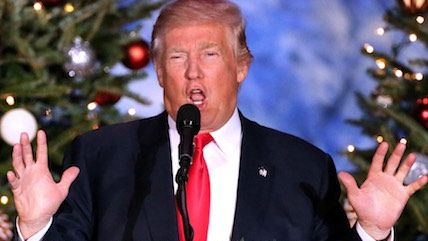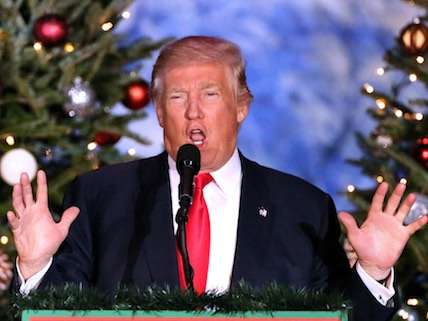What This Journalist Saw During a Holiday Detour Through Donald Trump's America
Few expressed a sense of apocalyptic dread on par with the media.


For this Washington, D.C.-based journalist, going home for the holidays means returning to the suburbs of Detroit, Michigan. The house where I lived for the first 18 years of my life is located in Macomb County—where a majority of voters chose Donald Trump for president last November, even though Barack Obama had won their support in both 2008 and 2012.
Macomb is one of the 209 counties across the country that went Obama, Obama, Trump. It's an overwhelmingly white place—85 percent of the 800,000 people who live there are white—with a median household hold income of $52,000, which is right in line with the nationwide average.
While the American electorate's unique and specific hatred of Hillary Clinton has been the dominant political narrative since November 8th, it does not explain the outcome in Macomb County. Trump didn't just win a higher percentage of the votes—he actually got more overall votes than Obama did in 2008 and 2012 (224,000 vs. 223,000 and 208,000). It wasn't just that people hated Clinton—they actually liked Trump. They trust that he is going to fix what's wrong with Michigan's economy.
That's what they told me, anyway.
--
My wife and I have lived in D.C. for two years—we share an apartment with a pair of adorable Yorkies. It's easier to transport them via car than airplane, so when the holidays roll around, we typically rent a car and all four of us drive back to Michigan.
This year, we got a flat tire about two hours outside of D.C., in rural Pennsylvania. I called the rental car company, and they dispatched roadside assistance. The man who came to change our tire was in his fifties or sixties—he pulled up in a pickup truck adorned with two bumper stickers: "INFOWARS" and "HILLARY FOR PRISON." Sean Hannity was blaring on his radio. He wore a sleeveless jacket, despite the cold.
It took him three minutes to put on the spare tire—something I couldn't have done in any amount of time. I was uncomfortable even standing outside while he did it, given how cold it was. After he finished, he wished me a Merry Christmas—emphasis on the Merry Christmas—and drove off.
On the phone, the rental car company instructed us to proceed to a rental location 20 miles away. This afforded us a detour through one of Pennsylvania's southern counties, which might as well be the capital of Trump's America. Only about 3,000 people live there, and the median household income is just $28,000. These people voted for Trump overwhelmingly. More than a month after the election, Trump signs still clung to telephone poles. Someone had even painted "TRUMP" on the side of a collapsing shack.
The branch of the rental car company was a lonely place, the day before Christmas Eve. The single employee working the office was a friendly guy in his twenties. It didn't take him long to suggest that he was keen on leaving the town after he had enough sales experience under his belt.
He only had one car left to offer me as a replacement: a maddeningly large passenger van (my wife and I dubbed it the double-decker party bus). Before we could leave, he flagged me down and brought me back into his office. He had looked up our contract, and was astonished at how much we had agreed to pay: he had never seen a rental car that cost so much. Rental rates vary according to pick-up location, and D.C.'s lowest-priced option (my initial choice) was vastly more expensive than this county's most luxurious rental. Since I was now going to be driving a different vehicle, the guy offered to delete my previous rental from the computer system and rent the new car under a more reasonable rate.
This was no easy task: the computer system did not want to let him save me money. Moreover, he was worried he would get in trouble with his bosses.
"If they call you, you have to tell them you were furious," he said. "You have to say you were ready to storm out and take your business elsewhere unless I did this for you."
I said that wouldn't be a problem.
"Great," he replied. "Thanks."
I don't know why he thanked me. He was doing me the favor.
--
It wasn't just southern Pennsylvania: Trump signs littered the yards of Macomb County residents, too. Over Christmas break, when I talked with friends and family members about the implications of the election, few expressed a sense of apocalyptic dread on par with my fellow journalists back in D.C. People wanted to give Trump a chance and see what he would do.
The woman who cuts my hair—and has done so for over two decades—was ecstatic. When I showed up for my appointment on Christmas Eve morning, she greeted me with a big hug and said, "He won!"
At my previous haircut appointment, during a trip back to Michigan for my brother's wedding over the summer, I had calmly informed her that Trump—the candidate she had preferred all along, even before the Republican primaries—had no shot of winning. Everyone I knew thought so, I had told her, to considerable disappointment. She wasn't sure I was right about that. But I was the one who spent time amongst all the smart, professional, political experts and writer types. What did my barber know about it?
She had bought the salon from the previous owner almost 20 years ago, slowly updating and transforming it into the popular local business it is today. There were hardships along the way—losing her husband to cancer, Michigan's economic woes—but she maintains an unshakably positive attitude.
You might have expected her to gloat when I saw her this Christmas—she had been right about Trump's chances, I was wrong—but she didn't. She even said she felt sorry for Hillary.
--
I couldn't help but dwell on these interactions as my wife and I returned to D.C. a little more than a week ago.
Our friends are almost universally journalists, think tanks staffers, and government employees. Most of them are at least as socially liberal as we are. We listen to the same music and watch the same television shows. We read the same news articles—in many case, we've had drinks with the people who wrote them.
It's a bubble. Can't deny it. Just is.
Macomb County and southern Pennsylvania are bubbles, too. The people who live there and expressed some optimism about Trump, some sense of hope now that he has won the presidency, might be wrong to feel that way. (I certainly believe so: if Trump fulfills his promises with respect to immigration and free trade, the country will be much worse off.)
But it's the journalist's job to inform the public about what's going on in those other bubbles. And while there was a lot of great reporting in 2016 about Trump supporters and what motivated them, I still can't shake the feeling that so many in the media discounted the possibility of a Trump presidency because they couldn't imagine anybody actually voting for him. In that way, D.C. and New York City media circles are like elite college campuses: wholly incapable of grappling with the fact that the U.S. is a massive place that includes millions of people who live very different lives and hold very different views.
It's okay to live in different bubbles if we're going to leave each other alone. (Thus the reason for the libertarian project of shrinking the oppressive power of the state.) But that's not how it works right now. As long as we are willing to give tremendous authority to a sole person chosen by the masses—be it Donald Trump or Hillary Clinton or Barack Obama or someone else—we could all stand to do a better job empathizing with the guy who changes our tires.


Show Comments (279)